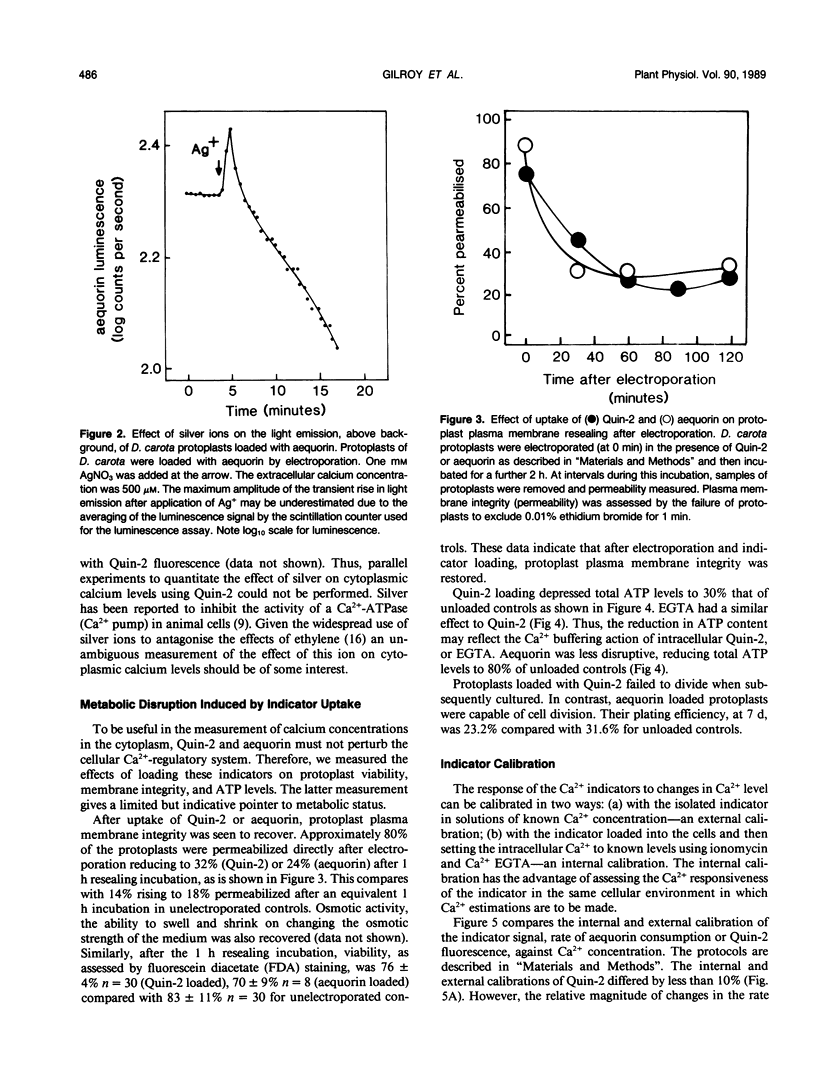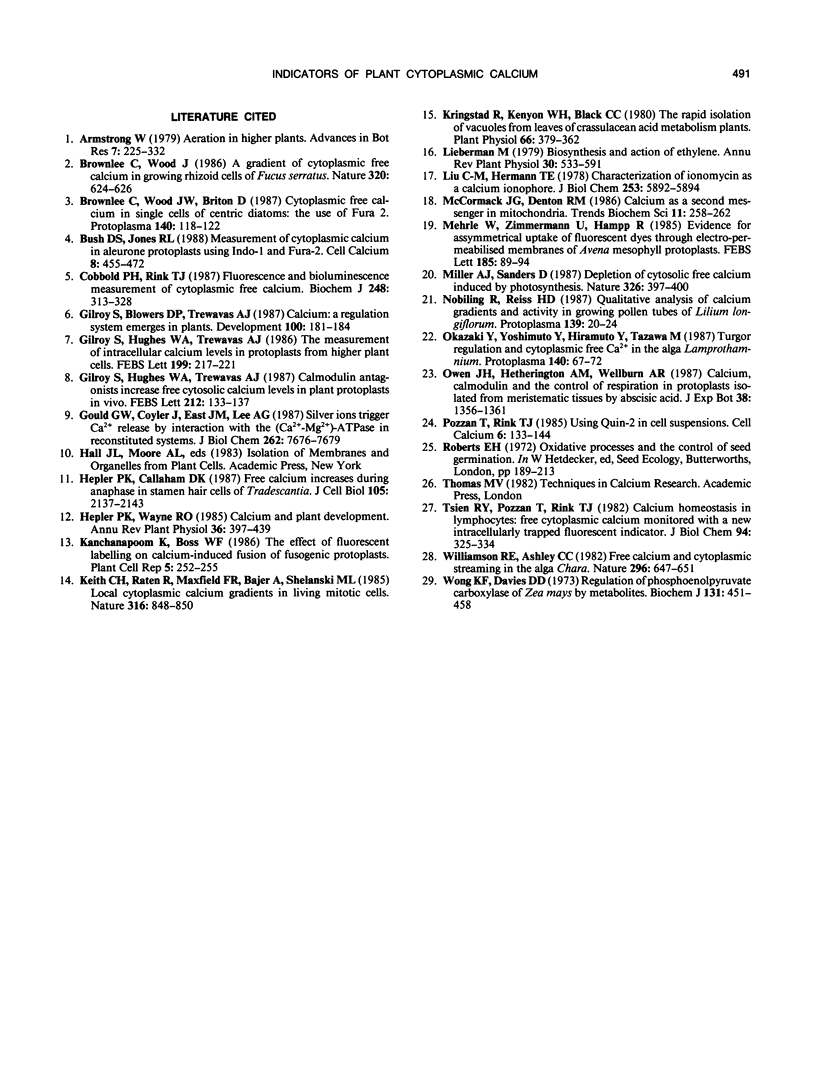Abstract
Assessment of the regulation of plant metabolism by the calcium ion requires a knowledge of its intracellular levels and dynamics. Technical problems have prevented direct measurement of the concentration of intracellular Ca2+ in plant cells in all but a few cases. In this study we show that electropermeabilized protoplasts of Daucus carota and Hordeum vulgare took up the Ca2+ indicating fluorescent dye methoxyquinoline(O-aminophenoxy)ethane-N,N,N′,N′-tetraacetic acid (Quin-2) and the Ca2+ indicating photoprotein, aequorin. These protoplasts subsequently recovered their plasma membrane integrity. However, up to 10% of intracellularly trapped Quin-2 was associated with a protoplast vacuolar fraction. Also, Quin-2 loading reduced total ATP levels by approximately 60% and inhibited subsequent protoplast division whereas aequorin loading reduced ATP content by only 20% and did not prevent division. Therefore, the basal cytoplasmic Ca2+ level measured with aequorin (less than 200 nanomolar) may more reliably reflect that found in vivo in the unperturbed protoplast than that measured with Quin-2 (120-360 nanomolar). However, measurements made with aequorin were found to be inaccurate at Ca2+ levels below 200 nanomolar, Quin-2 proving complementary in indicating these low Ca2+ concentrations. Cytosolic Ca2+ was observed to increase on treatment with azide and silver ions.
Full text
PDF









Selected References
These references are in PubMed. This may not be the complete list of references from this article.
- Bush D. S., Jones R. L. Measurement of cytoplasmic calcium in aleurone protoplasts using indo-1 and fura-2. Cell Calcium. 1987 Dec;8(6):455–472. doi: 10.1016/0143-4160(87)90029-7. [DOI] [PubMed] [Google Scholar]
- Cobbold P. H., Rink T. J. Fluorescence and bioluminescence measurement of cytoplasmic free calcium. Biochem J. 1987 Dec 1;248(2):313–328. doi: 10.1042/bj2480313. [DOI] [PMC free article] [PubMed] [Google Scholar]
- Gould G. W., Colyer J., East J. M., Lee A. G. Silver ions trigger Ca2+ release by interaction with the (Ca2+-Mg2+)-ATPase in reconstituted systems. J Biol Chem. 1987 Jun 5;262(16):7676–7679. [PubMed] [Google Scholar]
- Hepler P. K., Callaham D. A. Free calcium increases during anaphase in stamen hair cells of Tradescantia. J Cell Biol. 1987 Nov;105(5):2137–2143. doi: 10.1083/jcb.105.5.2137. [DOI] [PMC free article] [PubMed] [Google Scholar]
- Keith C. H., Ratan R., Maxfield F. R., Bajer A., Shelanski M. L. Local cytoplasmic calcium gradients in living mitotic cells. 1985 Aug 29-Sep 4Nature. 316(6031):848–850. doi: 10.1038/316848a0. [DOI] [PubMed] [Google Scholar]
- Kringstad R., Kenyon W. H., Black C. C. The rapid isolation of vacuoles from leaves of crassulacean Acid metabolism plants. Plant Physiol. 1980 Sep;66(3):379–382. doi: 10.1104/pp.66.3.379. [DOI] [PMC free article] [PubMed] [Google Scholar]
- Liu C., Hermann T. E. Characterization of ionomycin as a calcium ionophore. J Biol Chem. 1978 Sep 10;253(17):5892–5894. [PubMed] [Google Scholar]
- Rink T. J., Pozzan T. Using quin2 in cell suspensions. Cell Calcium. 1985 Apr;6(1-2):133–144. doi: 10.1016/0143-4160(85)90040-5. [DOI] [PubMed] [Google Scholar]
- Tsien R. Y., Pozzan T., Rink T. J. Calcium homeostasis in intact lymphocytes: cytoplasmic free calcium monitored with a new, intracellularly trapped fluorescent indicator. J Cell Biol. 1982 Aug;94(2):325–334. doi: 10.1083/jcb.94.2.325. [DOI] [PMC free article] [PubMed] [Google Scholar]
- Williamson R. E., Ashley C. C. Free Ca2+ and cytoplasmic streaming in the alga Chara. Nature. 1982 Apr 15;296(5858):647–650. doi: 10.1038/296647a0. [DOI] [PubMed] [Google Scholar]
- Wong K. F., Davies D. D. Regulation of phosphoenolpyruvate carboxylase of Zea mays by metabolites. Biochem J. 1973 Mar;131(3):451–458. doi: 10.1042/bj1310451. [DOI] [PMC free article] [PubMed] [Google Scholar]


